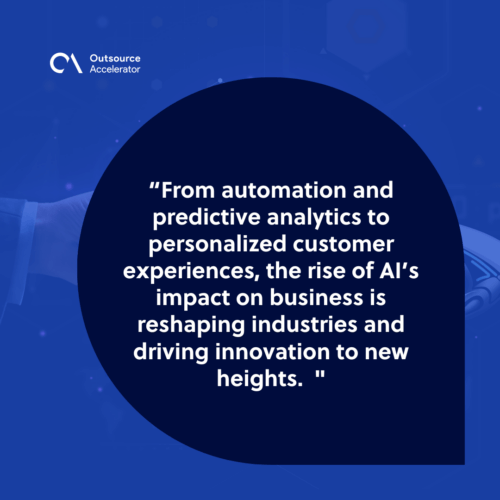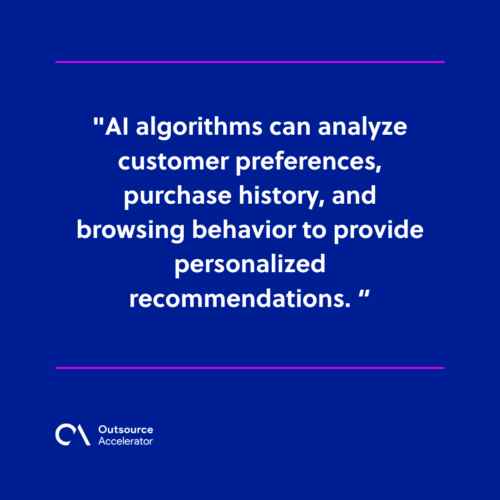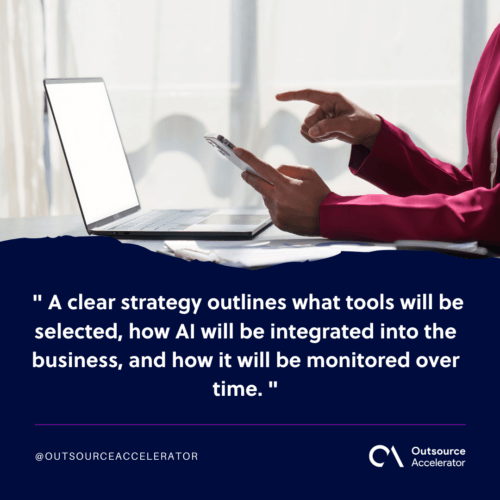Navigating the future: AI’s impact on business

Artificial intelligence (AI) has emerged as a transformative force fundamentally reshaping the business landscape.
AI can analyze vast datasets, automate tasks, and offer insights that shape strategic decisions. It’s become a powerful driver of growth, efficiency, and innovation in various industries.
As AI technologies mature and become more accessible, their impact on businesses becomes increasingly significant.
This article delves into the remarkable journey of AI’s impact on business. We explore its applications, the opportunities it presents, and the challenges that come with its adoption.
The rise of AI in business
AI was initially seen as a futuristic concept associated with sci-fi films and thought to be out of reach for practical applications.
However, recent technological advancements have propelled it forward and made it a powerful business tool. Increases in computing power and access to massive amounts of data heavily contributed to this.
Organizations began to recognize how AI could provide them with a competitive advantage. As a result, its adoption has skyrocketed, with various sectors embracing its capabilities and integrating AI solutions into their strategies.
From automation and predictive analytics to personalized customer experiences, the rise of AI’s impact on business is reshaping industries and driving innovation to new heights.

AI in various industries
AI’s impact on business can be seen in these industry applications:
- Financial services
- Fraud detection
- Algorithmic trading
- Credit scoring
- Risk assessment
- Healthcare and life sciences
- Medical image analysis
- Drug discovery
- Patient diagnosis
- Personalized treatment plans
- Manufacturing and quality control
- Smart factories
- Predictive maintenance
- Quality control
- Process optimization
- Human resources and talent management
- Resume screening
- Initial interviews
- Candidate matching
- Energy management
- Energy consumption optimization
- Environmental impact assessment
- E-commerce and retail
- Product recommendations
- Personalized shopping experiences
- Optimized pricing strategies
- Inventory management
Common uses of AI in business
AI has a wide range of applications in business, transforming various aspects of operations and decision-making.
Here are some common uses:
Customer support
AI-powered chatbots and virtual assistants handle customer inquiries, provide support, and offer personalized recommendations. These AI systems can engage in conversations using natural language processing (NLP).
AI can enhance customer service by resolving routine issues, understanding feedback, and even escalating complex queries to human agents as needed.
Data analytics
AI algorithms can analyze vast amounts of data quickly and accurately. Firms can get insightful information and make data-driven choices.
AI helps businesses in market research, trend analysis, and predictive analytics. These processes empower them to understand customer behavior, make accurate forecasts, and optimize strategies.
Process automation
AI technology automates repetitive and mundane tasks, saving time and reducing errors.
In business, AI-powered automation can streamline workflows, handle data entry, manage inventory, and even perform quality control.
Personalization
AI enables businesses to deliver customized experiences by leveraging customer data and behavior patterns.
AI algorithms can analyze customer preferences, purchase history, and browsing behavior to provide personalized recommendations. This applies to marketing and advertising as well as content recommendation.
Brands can target specific customer segments and adjust ad spending in real-time for maximum ROI.

Cybersecurity
AI plays a crucial role in detecting and preventing security threats by monitoring network activities and identifying anomalies in real-time.
AI-powered cybersecurity systems can detect potential cyberattacks, mitigate risks, and proactively respond to emerging threats. This strategy enhances overall data security.
Supply chain optimization
AI helps improve supply chain operations by optimizing inventory management, demand forecasting, and logistics. By analyzing historical and current data, AI algorithms can optimize procurement, reduce costs, and enhance overall supply chain efficiency.
These are just a few instances of how AI is applied in the business setting. AI’s adaptability and potential make it a valuable tool across various industries.
As the technology continues to advance, AI’s applications in the business world are expected to expand and become even more diverse.
Ethical implications of AI on business
The ethical implications of AI in business are of growing concern as the technology becomes more prevalent in various operations. Organizations must carefully consider and address these concerns:
Impact on employment
Perhaps the most prominent concern about AI’s impact on business is the fear that it will displace human workers.
Companies must navigate this transition responsibly by considering measures like reskilling and upskilling programs for employees whose jobs are at risk of automation.
Leaders should also remember that AI’s purpose should be to replace tedium, not large swathes of the workforce.
Potential for bias
AI algorithms can inadvertently perpetuate biases in training data, resulting in unfair or discriminatory outcomes. Much of this depends on the data that systems have been trained on and the personal biases of its programmers.
For example, if AI models are trained on data without adequate diversity considerations, they can discriminate against certain groups in areas like hiring or lending.
This raises important questions about fairness, accountability, and social impact that businesses must address.
Data privacy and security
Data privacy and security are also critical ethical issues regarding AI’s impact on business.
AI systems rely on vast amounts of data, including personal information, to make predictions and decisions. Ensuring the proper handling and protection of this data is essential to maintain customer trust and comply with privacy regulations.
Transparency and explainability
The transparency and explainability of AI algorithms pose ethical challenges. It might be challenging to interpret and comprehend complex machine learning models. It can be hard to explain the basis for decisions or identify potential biases.
This lack of transparency can erode trust and acceptance of AI systems in both customers and employees.
Autonomy and decision-making
AI systems influence decision-making, particularly in areas like finance and healthcare. Questions arise about who should be ultimately responsible for AI-driven decisions and actions.
Businesses should establish clear lines of accountability.
Tips for implementing AI in business
Implementing AI in business can be a complex process, but following certain tips can help ensure a successful and smooth transition.
Aside from considering its ethical implications, here are some tips for implementing AI in business:
- Identify business problems. This ensures that the investment is well-aligned with the company’s goals.
- Develop a clear AI strategy. A clear strategy outlines what tools will be selected, how AI will be integrated into the business, and how it will be monitored over time.
- Build cross-functional teams. Bring together a diverse set of skills, including data scientists, software developers, project managers, and business stakeholders.
- Prioritize data quality and governance. AI relies on high-quality, well-governed data to produce accurate and reliable results.
- Start small and iterate. Begin with a pilot project to test feasibility, then iteratively improve and refine the AI model based on feedback and performance.
- Invest in employee reskilling and upskilling. New training helps employees adapt to changes and ensures they embrace the benefits of AI.

The future of AI in business
The future outlook of AI in business is quite promising, with the technology expected to continue advancing and impacting various aspects.
Several key trends and developments characterize the future of AI in business:
- Increased adoption – AI will continue to permeate various industries, including healthcare, finance, manufacturing, and retail, as the technology becomes more accessible.
- Emerging technologies – AI will play a central role in emerging technologies, such as autonomous vehicles, quantum computing, and the Internet of Things.
- Human-AI collaboration – The workforce will increasingly collaborate with AI tools, amplifying human capabilities and enabling employees to focus on creative, high-value tasks.
- Regulations and standards – Governments and regulatory bodies are expected to develop guidelines around using AI in business to ensure responsible and ethical practices.
The future of AI’s impact on business holds tremendous potential. As technology evolves, AI will become increasingly integrated into various business functions.
However, addressing ethical concerns and ensuring responsible AI use will be critical for its successful and widespread adoption.







 Independent
Independent




